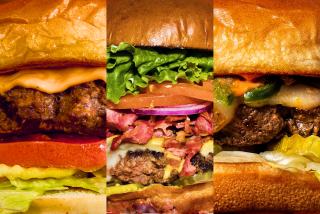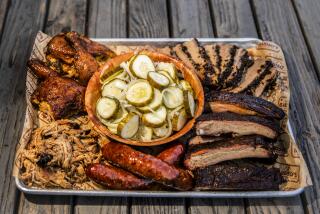This Small California Town Has More Hams Than Hollywood
- Share via
CALIFORNIA, Mo. — Ask Missourians what California is famous for and chances are they’ll say hickory-smoked, sugar-cured, country hams--not Hollywood, the Golden Gate Bridge, sunshine and beaches or Yosemite.
That’s because California, a small town in the heart of the “Show Me” state, is home of one of the biggest country ham processing plants in the nation.
At the south end of this sleepy little farm center, is Burgers’ Ozark County Cured Hams. Strangers find Burgers’ by following their noses to the aroma wafting from the smokehouse and permeating the air for miles.
Burgers’ is a family business started in 1952 by farmer E. M. Burger, who died in 1972. He cured, aged and smoked ham all his life for his family, as did his father before him.
Then 36 years ago, E. M. constructed a curing house and began processing country hams full-time.
He processed 1,000 hams that first year, 5,000 hams by the end of the fifth year. Ten years ago, Burgers’ processed 180,000 country cured hams, last year 300,000.
“During the ‘20s, ‘30s and ‘40s, in this part of the country every farmer aged and cured country hams up and down the road for family use before the arrival of electricity and refrigeration,” explained Morris Burger, 52, E. M.’s son and president of Burgers’.
Today, there are about 150 fair-sized processors, mainly in a country ham belt stretching through the South from Missouri to Kentucky, Tennessee, Virginia, Georgia and the Carolinas, nearly all tracing their roots to a farmer down the road like E. M. Burger.
Last year, 92 million pounds of country ham were sold in the United States, bringing producers an average of $1.40 a pound or a wholesale value of about $130 million, reports Jens Knutson, an economist with the American Meat Institute in Arlington, Va.
Yet country aged and cured hams are specialty items, representing only about 5% of all hams produced in the United States.
Nine members of E. M. Burger’s family work at the ham plant, which now employs 115. His son is president. E. M.’s widow, Natalia, 84, and her sister, Margaret Bueker, 86, continue to label the sacks the hams are shipped in, open and sort mail and tie 600,000 strings a year for hanging hams.
“We don’t slaughter hogs here. We’re in the heart of the nation’s hog producing area and buy the best hams available,” Morris Burger said.
Two types of country cured hams are produced at Burgers’, Ozark hams cured and aged while hanging an average of one year in the natural old-fashioned way, and Southern Smokehouse hams cured and aged four to six months.
Burgers’ produces about 25,000 of the one-year naturally aged Ozark hams a year. But the most popular by far are the milder four-to-six month country hams, which sell at the same price as hams hanging twice as long.
For years, country hams were only sold to homes. In recent years, sales have increased considerably as Burgers’ and other country ham processors began to sell sliced ham. In the South and some other parts of the nation fast-food chains such as McDonald’s and Hardies serve country ham on biscuits.
Burgers’ sells 90% of its hams directly to restaurants, grocery stores and gift shops in Missouri, Kentucky, Tennessee and Arkansas under its own label and 60 other labels.
The company ships 10% of its hams through mail orders to all 50 states, with the largest volume to Texas, California, Florida and New York. Burgers’ also sells country bacon and sausages. Eighty percent of its sales are in hams and 20% in bacon, sausage and other meat products.
More to Read
Sign up for The Wild
We’ll help you find the best places to hike, bike and run, as well as the perfect silent spots for meditation and yoga.
You may occasionally receive promotional content from the Los Angeles Times.






